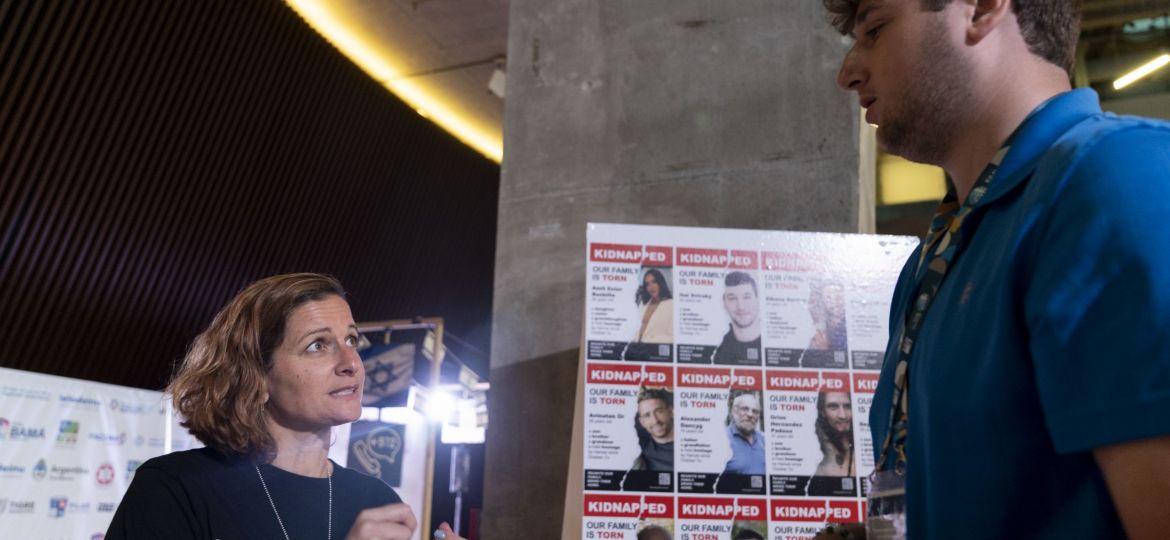
WRITTEN BY AARON HOOK
Wrapping tefillin is said to connect your brain, heart, and hands. The leather straps that loop around your non-dominant arm and the crown of your head are what Deuteronomy 6:8 refers to when it says “You shall bind them as a sign upon your hand, and they shall be for a reminder between your eyes.” The way you lay the straps across your arm means something. The three straps near the top of the arm piece, or the shel yad, resemble the Hebrew letter shin (ש), the first letter of G-d’s name, to keep you aware of G-d’s presence. Putting on tefillin is considered to be one of the greatest daily mitzvahs.
I personally took up wrapping every day after October 7, 2023, when Israel was attacked by the terrorist group Hamas. The ruthless and incomprehensible acts against Israeli citizens created a surge of antisemitism on college campuses. It had always been present, but now there was a new angle to push the hatred. I could not be a silent Jew.
I grew up attending a conservative synagogue, but after my Bar Mitzvah, hadn’t really embraced my Jewish identity. I was always proud of my religion and a minority because of it. I realized that if I didn’t spend 5-10 minutes of my day to complete this simple, yet powerful mitzvah at a time like this, I would always be silent. And staying silent was not an option for me.
So I began wrapping with the Rabbi on my campus, at the Chabad at Rowan University in Glassboro, New Jersey, six days a week – every day but Shabbos, as the tradition goes. I also started attending Shabbos dinners and other Chabad events, including a prayer and a vigil right after the October 7 attacks. I noticed the Chabad was also organizing an opportunity for students to travel to Washington, D.C., on November 14, to march in support of Israel. I had a big project due the next day, so I considered missing it. But I knew people who were going and, once again, I felt compelled to take part in Jewish history and stand with others in solidarity during a difficult time. So I woke up early, boarded a bus to D.C., and found myself among more than 300,000 Jews gathering outside the capitol, the largest gathering of Jews in recorded history.
It was the right choice.
When we sang “Hatikvah,” everyone around me started putting their arms around each other, swaying, and singing in unison. We listened to the Israeli President, Isaac Herzog, speak and shared stories of those who were lost or affected on October 7. Walking through the massive sea of people, I felt like I somehow knew everyone there, even though people had traveled many miles to join together and acknowledge that our place in the world was once again being tested – and that when we are together, nobody could erase us.
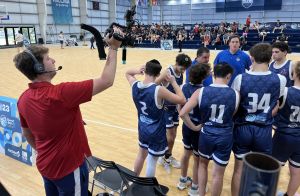 A month later, in Argentina, I would gather with thousands of Jews again – this time, as a member of the Maccabi USA media team. I had originally applied to be on the 2022 media team that covered the 21st Maccabiah in Israel but I wasn’t qualified enough. For more than a year, I worked on diversifying my resume, sharpening my camera work, and editing to the point where I thought I could handle the workload and fast pace that would come with covering a 10-day event like the Pan American Maccabi Games in Buenos Aires. The opportunity was also a chance for me to be around hundreds of Jewish athletes and students in a place where we could truly connect.
A month later, in Argentina, I would gather with thousands of Jews again – this time, as a member of the Maccabi USA media team. I had originally applied to be on the 2022 media team that covered the 21st Maccabiah in Israel but I wasn’t qualified enough. For more than a year, I worked on diversifying my resume, sharpening my camera work, and editing to the point where I thought I could handle the workload and fast pace that would come with covering a 10-day event like the Pan American Maccabi Games in Buenos Aires. The opportunity was also a chance for me to be around hundreds of Jewish athletes and students in a place where we could truly connect.
However, the question of how I would continue wrapping tefillin every day loomed in my mind and became more and more pressing our training camp in New York inched closer. After wrapping for 17 consecutive days at school, my Chabad Rabbi suggested I get my own pair, but guess how much a pair of tefillin costs? Look up “cheap pairs of tefillin” and see how far off you were.
Yet when I first arrived at Chabad of the Five Towns in Cedarhust, New York, to meet the media team, I was relieved when we were given a chance to wrap so I could at least start a day-by-day mentality of finding a way to do it. To my amazement, right before lunch on that first day, Rabbi Zalman Wolowik stopped me and handed me a brand new pair of tefillin. I was shocked. For him to do that without asking for anything in return – simply my commitment to wrap – sparked a new type of fire in me. I couldn’t believe how trusting he was, and I knew that he would be counting on me to put it on daily and be a mitzvah man, even during the Games’ hectic schedule so far from home.
When I put my own pair on for the first time, it felt like I had a personal way to connect with G-d. To finally have a moment of prayer at my fingertips and escape the outside world for just a few minutes was a great feeling.
In Buenos Aires, I made the most of it. Over 10 days, I wrapped and davened in the morning twice with members of the U16 and U18 basketball teams and coaches. There were others I felt an obligation to wrap for as well. My close friend’s brother started training for the IDF after October 7 and would soon be a soldier. To imagine someone like him being sent to war was simply unfathomable.
I also attended Shabbos Services in Argentina and got to know some of the athletes, families and representatives from the United States delegation.
Also on this trip, I met someone who is now counting on me most of all – and it doesn’t even have to do with wrapping tefillin.
 On December 30, two survivors of the October 7 attacks spoke at the Buenos Aires Convention Center (CEC). One of them, Sharon Cohen, lost family, friends, neighbors and saw her small community in Kibbutz Be’Eri ravaged by terrorists.
On December 30, two survivors of the October 7 attacks spoke at the Buenos Aires Convention Center (CEC). One of them, Sharon Cohen, lost family, friends, neighbors and saw her small community in Kibbutz Be’Eri ravaged by terrorists.
She mentioned during the speech that she was not a very religious person, but that when she and her family were trapped in their safe room with terrorists on the other side of the door trying to barge their way in, her immediate response was to recite, “Sh’ma Yisrael,” which roughly translates to “Please listen to the people of Israel.” In that moment, she was praying not only for the safety of her loved ones and herself, but for all of those being affected.
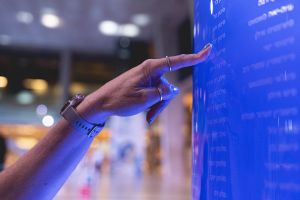 After Sharon’s talk, I saw her standing by a memorial in the CEC which contained the names of all those who were murdered on October 7, including some she knew personally. I talked with her for a few minutes about her experience and how she was moving forward after such a tragedy. I couldn’t help noticing a square silver necklace she wore, with four small rectangular openings in the middle. I figured it meant something. When I asked, she flipped the necklace over, and revealed two inscriptions: on top, in Hebrew, it read: “הלב שלנו שב׀׳ בעזה” meaning “Our Heart is in Gaza.” On the bottom, in English, it said, “Bring them home, NOW!” referring to the 200+ Israeli hostages still in captivity.
After Sharon’s talk, I saw her standing by a memorial in the CEC which contained the names of all those who were murdered on October 7, including some she knew personally. I talked with her for a few minutes about her experience and how she was moving forward after such a tragedy. I couldn’t help noticing a square silver necklace she wore, with four small rectangular openings in the middle. I figured it meant something. When I asked, she flipped the necklace over, and revealed two inscriptions: on top, in Hebrew, it read: “הלב שלנו שב׀׳ בעזה” meaning “Our Heart is in Gaza.” On the bottom, in English, it said, “Bring them home, NOW!” referring to the 200+ Israeli hostages still in captivity.
Sharon then did something unforgettable. She lifted the necklace over her head, held it up to me, and said, “It’s yours now.”
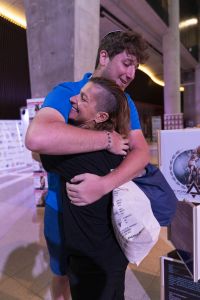 I couldn’t accept the necklace. How could I? I would never know the pain this woman had gone through. I didn’t feel like I could wear it. But she insisted, and I immediately knew that I would wear it as long as there were still hostages in Gaza.
I couldn’t accept the necklace. How could I? I would never know the pain this woman had gone through. I didn’t feel like I could wear it. But she insisted, and I immediately knew that I would wear it as long as there were still hostages in Gaza.
Then Sharon said to me, “I’m counting on you.”
Somehow she saw in me, a kid she met for five minutes (just like the Rabbi in New York), as someone she could trust to carry this message back home to New Jersey and wherever the road of life may take me. The trust she had instilled in me meant there was no other option but to honor her request. I couldn’t let her down.
Just as I had people counting on me to wrap tefillin daily, she was counting on me to keep this around my neck and near my heart every day. It has been and will continue to be a daily reminder of what our people are going through and to spread the message of what it represents – and the incredible story of how I received it – to as many as possible.
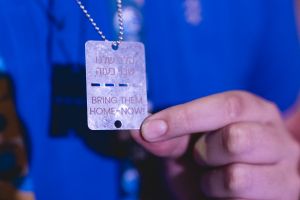 Aaron Hook is a senior at Rowan University studying sports communication and media. He’s done play-by-play for Rowan athletics and professional organizations including the G-League affiliate of the Philadelphia 76ers, the Delaware Blue Coats. He also contributes to the sports section of the school’s newspaper, The Whit. Follow Aaron on Twitter @aaronhook_ and at www.maccabiusa.com.
Aaron Hook is a senior at Rowan University studying sports communication and media. He’s done play-by-play for Rowan athletics and professional organizations including the G-League affiliate of the Philadelphia 76ers, the Delaware Blue Coats. He also contributes to the sports section of the school’s newspaper, The Whit. Follow Aaron on Twitter @aaronhook_ and at www.maccabiusa.com.
